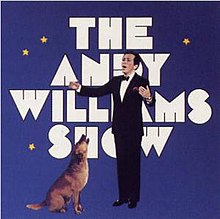| The Andy Williams Show | ||||
|---|---|---|---|---|
 | ||||
| Studio album by | ||||
| Released | 1970 | |||
| Recorded | March 21, 1968 April 8, 1970 July 13, 1970 August 31, 1970 [1] | |||
| Genre |
| |||
| Length | 31:50 | |||
| Label | Columbia | |||
| Producer | Mike Post Nick DeCaro [3] | |||
| Andy Williams chronology | ||||
| ||||
| Review scores | |
|---|---|
| Source | Rating |
| Allmusic | |
| Billboard | Spotlight Pick [4] |
| The Encyclopedia of Popular Music | |
The Andy Williams Show is the twenty-sixth studio album by American pop singer Andy Williams, released in the fall of 1970 by Columbia Records. [2] In his review on AllMusic, William Ruhlmann writes that "The Andy Williams Show LP was not a soundtrack recording from the TV series, and it was not really a live album, although it gets categorized as such. What appears to be the case is that Columbia Records took a group of Williams' studio recordings, most of them made during the summer of 1970 and consisting of his versions of recent soft rock hits, and added a lot of canned applause along with some of the kind of musical interludes used to usher numbers on and off on the show, including bits of its "Moon River" theme music at the start and the finish." [2]
Contents
- Reception
- Track listing
- Side one
- Side two
- Recording dates
- Song information
- Personnel
- References
- Bibliography
The album made its first appearance on the Top LP's chart in the issue of Billboard magazine dated November 14, 1970, and remained on the album chart for 17 weeks, peaking at number 81. [6] It entered the UK album chart the following month, on December 5, and reached number 10 over the course of six weeks. [7] it also debuted on the Cashbox albums chart in the issue dated November 28, of that year, and remained on the chart for in a total of 7 weeks, peaking at 82 [8]
The Andy Williams Show was released on compact disc as one of two albums on one CD by Collectables Records on February 5, 2002, along with Williams's 1971 Columbia album, You've Got a Friend . [2] Collectables included the CD in a box set entitled Classic Album Collection, Vol. 2, which contains 15 of his studio albums and two compilations, in 2002. [9]